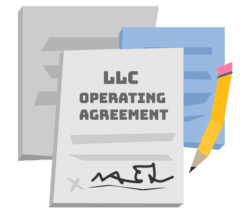How to Start an LLC in California
Starting an LLC in California is a smart move if you want liability protection, a flexible management structure, and different tax options. California charges $90 to start an LLC, but within about four months, you’ll also have to pay the $800 franchise tax.
To start an LLC, you fill out paperwork—called California Articles of Organization—and submit it to the California Secretary of State. You can do it yourself or hire someone (like us) to do it for you. There are also several other steps you’ll need to take to fulfill requirements with the federal government, strengthen your liability protection, and protect your privacy. Here’s how to do it.

1. Name Your LLC
The very first thing you need? A name. Sounds easy enough, but your name has to meet some requirements. And most importantly, it needs to be available.
You can find the exact rules in CA Corp Code § 17701.08, but here are the basics.
- Include LLC, Limited Liability Company, Ltd. Co., or some combination of identifiers.
- Don’t use words that might trick people into thinking your company is something that it isn’t, like corporation or bank.
- Be unique! If your name is too close to the name of another business operating in California, your paperwork will be rejected. You can check by doing a Business Name Search in California.
Your business name is listed on your Articles of Organization. If you would like to do business under a different name, you’ll need to register a Fictitious Business Name (FBN). This is done at the city or county level. Prices range from $10 to $60.
Once you register your FBN, you’ll need to publish a notice in a local newspaper once a week for four consecutive weeks. Want to skip the headache? For just $125 + county fees, we’ll register your FBN for you when we form your LLC or act as your agent for service of process.

2. Claim Your Domain Name
Your domain name is the first step of getting your business online. From launching a website, building social media profiles, setting up email communications, and printing business cards, choosing a good domain name opens up a lot of doors for your business to reach customers.
When you choose your business domain, consider:
-
Does your domain work well with your business name?
-
Is your domain easy to remember and spell?
-
Is your domain available wherever else you want it, like social platforms, trademarks, or business name registries?
Once you have a domain you’re happy with, it’s time to claim it. When you order your domain through Northwest, we’ll also set you up with a website, custom built by our business website experts, hosted and secured through us. You can test drive that website completely free for 90 days.

3. File California LLC Articles of Organization
Articles of Organization is the name of the form you’ll submit to the California Secretary of State. Once they approve your paperwork, your LLC is official. But you want to make sure you get it right. Otherwise, they’ll reject your paperwork and you’ll be back at square one. Here’s the information you’ll need for your California Articles of Organization.
Remember, it needs to include some version of LLC or Limited Liability Company. Most importantly, it needs to be unique in the state of California.
Next, you need to list your business address. The address you list here doesn’t actually have to be your LLC’s office, but it does have to be a street address in California. No P.O. Boxes.
The address you list here will go on the public record, which means anyone will be able to find it online. Because of that, we recommend using your agent for service of process’s address here. Not sure what an agent for service of process is? Head to the next step.
A registered agent (called an agent for service of process in California) is a person or company that you designate to receive official mail on behalf of your LLC. If your LLC is ever served with a lawsuit, the process server will deliver the paperwork directly to your agent.
Once your agent for service of process accepts the paperwork, your business is legally considered served. The agent for service of process should then forward you your mail—quickly and securely. Appointing an agent is a legal requirement in California.
Legally, your California agent for service of process must:
- Have physical street address (not a P.O. Box or virtual office) in your state.
- Be available during regular business hours at this address.
- List their street address on the public record.
Tip: If you meet these requirements, you can be your own agent. If you’re always on the go, or if you’re hoping to live more privately with your LLC, you can hire us to act as your California agent for service of process.
This is where you indicate who will manage your LLC—members or managers.
- In a member-managed LLC, the owners run the business.
- In a manager-managed LLC, a hired manager or managers run the business.
Tip: You can appoint an owner (member) to be a manager; in this case, you’d name them a managing-member of the LLC, and your LLC is manager-managed. This only works in a multi-member LLC where not all members are managers.
Nothing for you to do here—California has written your business purpose statement for you, and you can’t change it.
The organizer is just whoever is singing and submitting this paperwork. This doesn’t even have to be someone within your LLC. However, your organizer’s information will become public record. If you hire Northwest, we’ll be your organizer and list our information here.
How Do You File the California Articles of Organization?
Filing just means getting your paperwork to the California Secretary of State with the correct filing fee ($70). You can do that a few ways.
You can drop it off in person here:
Secretary of State
Business Programs Division – Business Entities
1500 11th Street
Sacramento, CA 95814
Or mail it in here:
Secretary of State
Business Entities Filings
P.O. Box 944260
Sacramento, CA 94244-2600
Or do it online here:
California Secretary of State

4. Adopt an Operating Agreement
An operating agreement is just what it sounds like—an agreement on how your LLC should operate. A solid operating agreement will cover how your LLC will undertake important procedures, like voting, allocating profits, and resolving disputes. Operating agreements are internal documents, kept on record with your LLC. They’re not required by law in California, but they’re essential for any LLC.
Tip: Writing an operating agreement is hard. We had our attorneys draft an operating agreement specifically for use in California—you can use it for free.

5. Get an EIN
Your LLC probably needs to get an EIN (Employer Identification Number). Kind of like a Social Security number for your business, your EIN is a nine-digit number that the IRS will assign to your business for tax identification purposes. You’ll use your LLC’s EIN to open a business bank account, apply for loans and licenses, pay taxes, and protect your personal identity. You can apply for one online with the IRS or hire us to take care of it for you.

6. Get a Business Bank Account
If you let your personal finances mix with your business finances, you’re at risk of piercing the corporate veil (a dramatic-sounding metaphor that just means a court has found your LLC isn’t a separate entity from you, the owner). So you’ll need a business bank account. The bank will likely ask to see your operating agreement, EIN, and an LLC Resolution to Start a Bank Account.

7. File Statement of Information & Pay The Franchise Tax
Most states have some sort of annual or biennial reporting requirement—in California, you have to file a Statement of Information within 90 days of forming your LLC. It costs $20 to file and requires basic information about your LLC. We recommend that you just file it at the same time you form your LLC.
Then you can forget about it for two years, until it comes due again. And if you want to forget about it forever, you can hire us to file the California Statement of Information for you.
Then there’s the $800 California Franchise Tax. This is the annual tax you’ll pay for the privilege of doing business in California, and all businesses are required to pay it. Oof, what a bummer. As soon as you form an LLC, the clock starts ticking. You have four months and 15 days to pay it.

8. Get Ready for Business
Now that you’re legally ready to start making sales, it’s time to get physically ready. Depending on what your business does, this may include:
- staffing your business
- organizing your merchandise or products
- getting business insurance
Regardless of what your business does, you’ll need to get your name out to potential customers and have a way for them to get ahold of you. A good business website and business email addresses give clients a way to reach you directly. But vendors, employees, and legal agencies need a bit more formality than your website contact page.
That’s why many business owners get a California virtual office. Virtual offices let you organize your communication professionally no matter where you’re working while protecting your private information.
Our California Virtual Office service includes a unique address you can put on anything from your business cards to your invoices, a phone line with a local area code, and your choice of same-day digital scans and weekly physical mail forwarding.
Let’s Set Up Your California LLC!









